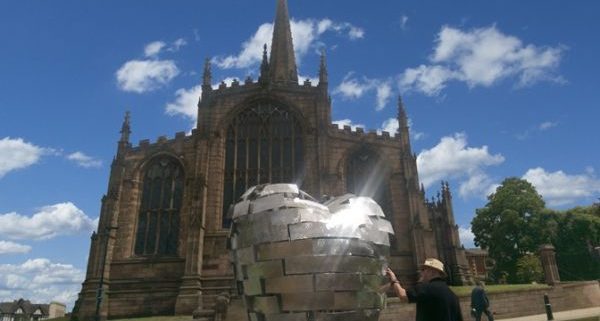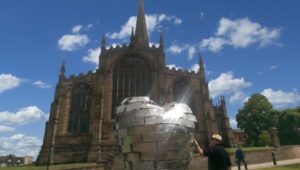“Seek the welfare of the city…” 18th July 2015
“Is not this the carpenter? Mark 6.2
Two weeks ago a heart of steel was unveiled in the centre of Rotherham, outside the Minster. The new heart is the first deposit of a major new landmark sculpture for the South Yorkshire region: the Yorkshire Man of Steel.
The Yorkshire Man of Steel will sit, 30 metres high above the M1 motorway next to the Tinsley Viaduct and above a new visitor centre. The aim is to create a symbol of identity for South Yorkshire: to honour “the people and places that forged a lasting global legacy in coal, steel and manufacturing in this region and to signpost the new technologies that will secure the region’s future success”[1]. It’s a worthy aim and a bold statement.
But the Man of Steel will also ask a number of questions as he sits high on his podium looking over South Yorkshire.
- What is the future of work in this region and across the world?
- What role will work play in human life with the rise of technology and automation?
- How can we help the people of this region prepare for a new world of work?
Work is never far from the news headlines. On Thursday, Tata Steel announced 720 job cuts from its UK business because of high energy costs. The losses are mainly in Rotherham. The budget a few weeks ago turned around the question of work: the living wage; the reductions in welfare; the move to increase Sunday trading; the measures to support business; the questions about productivity; the aspiration to offer a living wage. Technology is asking new questions about our working lives all the time.
The Church has a vital part to play in this conversation. We believe that Almighty God took flesh and came to live among us. Jesus lived most of his life not as a religious minister or teacher but as a carpenter, honouring skilled, manual labour. The first disciples were fishermen: they worked with their hands and they ran small businesses.
We have much to give to a conversation about work. There is a rich Christian understanding of the place of work in human life found in Scripture and the Christian tradition. This understanding is rooted in the distinctive understanding of what it means to be human. Women and men are never simply units of production. People are created in the image and likeness of God. Each person is of infinite value. We were created to be creative: to find satisfaction and fulfillment in our work. For the Christian, work is more than paid employment. It embraces the work of nurturing and caring for a family, voluntary work in the wider community, the creativity of hobbies or the arts.
Work is important but it is not the whole of life. The notion of Sabbath plays a vital role in both the Jewish and the Christian tradition. God gives to us time to rest as well as time to work. Rest is vital not only for recreation but also for reflection, for looking back at what we have done, to give satisfaction and meaning to our lives. One of the greatest gifts the Church has to offer the contemporary world is the gift of Sabbath and of a holy day, of one day in seven set aside for the worship of God, for rest and for reflection.
Pope Francis has recently written a letter to every person on the planet about the care of the earth, our fragile common home. Central to his argument is his reflection on the future of work and the value of work:
“We were created with a vocation to work. The goal should not be that technological progress increasingly replace human work for this would be detrimental to humanity. Work is a necessity, part of the meaning of life on this earth, a path to growth, human development and personal fulfillment.”[2]
“Business is a noble vocation, directed to producing wealth and improving our world”[3].
Work and the future of work are a vital part of human living. What then are we to say as part of Christ’s church about the role of work in this region we are called to serve?
The Yorkshire Man of Steel tells us what we already know. We are a region in transition. We need to honour our past but also look with confidence and creativity to the future. The massive mineral deposits in the earth of coal and iron, combined with human ingenuity, have shaped our industrial landscape and the working lives of many thousands of people.
We need to acknowledge the pain of this transition for our communities. The steel industry continues to change and evolve. We no longer produce the high volumes of steel with the attendant large scale employment. But high end steel remains hugely important to our economy. The coal industry which has shaped this region so powerfully has now largely gone. Just three weeks ago, the colliery at Hatfield was closed, the last deep mine in Yorkshire, with the loss of 430 jobs.
All of us are aware across the Diocese of Sheffield of the deep legacy of bitterness created by the premature closure of so many pits in the 1980’s and 1990’s. Those events still have a powerful effect on our region which goes much deeper than its economy. The geography of many of our towns and villages, the social fabric, the key buildings in our communities, the identity and self understanding, and the location of our churches are inextricably linked with the history of mining.
The deepest wounds of all from that period remain unhealed and are hard to understand and articulate. The closure of the mines was about more than this region’s economy or history or even our identity. The closure of the mines, I believe, was about decisions being imposed upon one part of our society and country by another without consent and due process. It is that enforcing of closure and change thirty years ago which damaged something profound in the identity of our region: which destroyed trust, confidence and hope. It is this sense of identity, trust, confidence and hope which most needs to be nurtured in the coming years, not least by the Church across this Diocese.
What then is the future of work in this region? There are some clear signs of hope. We have strong local leadership in the Sheffield City Region and an ambitious plan to create 70,000 new private sector jobs and 6,000 businesses over the next ten years.[4] This is supported by welcome investment from central government. Major investment in infrastructure is planned which will improve connectivity across the north. The service and digital sectors of the economy are flourishing. There is a strong alliance between universities, FE Colleges, local government and local industry. The Advanced Manufacturing Research Centre is a national beacon of excellence. There is a sense of people of good will working together for the common good of the region.
But no-one would pretend that the future is without challenges. Continued investment in education and skills is vital. That investment demands a close partnership between local government, industry, and schools, Further and Higher education. A demanding future calls for engaged and highly skilled leadership in local and national government, in education and in business and industry.
More importantly still, all the lead bodies across this region call for a higher ambition and aspiration and a global vision of what can be achieved.
Finally, what is the role of the Church in encouraging and enabling a positive vision of work and a positive future for our region?
The Church has a vital role to play in building a common vision of prosperity and meaningful work across our society. We are present in every community, seeking to lift horizons, to address the painful questions of the past, to build vital social capital and to help people look to a positive future. We play our own part as an employer. We are a key player in primary and secondary education and in lifting educational standards.
The Church has a vital prophetic voice, challenging local and national government about the meaning of work, about fairness in society, about proper investment in infrastructure and work in this region, about preserving space for Sabbath and reflection.
As a Church we are called to be salt and light in our communities. Christian disciples are present in many different places of work, in positions of influence, all across the region and beyond it. As a diocese and as a local church we seek to support and encourage one another in our engagement with places of work, through chaplaincy, through focusing on the workplace in sermons and in worship and in prayers.
Work is a vital part of human life now and in the future. As a Church we need a vision for work as part of life which is reflected in every part of our life together.
Long ago, the prophet Jeremiah wrote from Jerusalem to the first generation of exiles in Babylon. His advice rings down the ages to God’s people as a call to be concerned not just for religious life in a narrow sense but a call to be concerned for the whole life of the places where we live:
“But seek the welfare of the city where I have sent you into exile and pray to the LORD on its behalf, for in its welfare you will find your welfare”.[5]
We are called as God’s people in this place to seek the welfare and prosperity of this city, of these towns, of these villages, of this region. That means paying attention to the past, the present and the future world of work. That means being alert to the regional and the local challenges.
“Seek the welfare of the city” today and in all the years to come.


